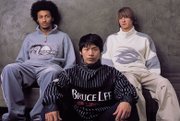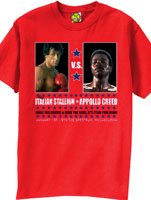From the Silver Screen to Silk Screen
Creating promotional products for movies is not a new idea. However, the last decade has ushered in a move from simple promotional T-shirts to full clothing lines connected with some of the most popular films and film icons of the times.
One of the newest such lines on the horizon is the result of a partnership between Universal Studios Consumer Products Group and New York-based Regal Wear. It’s called the Bruce Lee Collection and is a licensed line in the spirit of the late martial artist, who set a standard of excellence for martial arts filmmaking that remains the frame of reference to this day.
Lee has been a legend since the early 1970s and, as an icon, has not lost any luster over time, but almost 30 years after his passing, Universal, in association with Lee’s estate, has finally created an apparel licensing program to honor his legacy.
“We’ve actually had a very successful and sustained licensing program for years with things outside of apparel, with things like posters, calendars and collectible figures,” noted Timothy Rothwell, senior vice president of merchandising and marketing for Universal.
“I guess [our success is due to] the timing of the explosion of the urban market and the prevalence of martial arts, [which] has gotten so hot in this country,” said Carolyn Foreman, vice president of licensing at Universal. “Bruce Lee continues to be an icon year after year after year. We finally found the right partner in Regal Wear.”
As the original street fighter, Lee created a discipline of martial arts that stresses the ultimate freedom of the individual, which is something that many of today’s youth strive for in their lifestyle and in their clothing.
“He had his own style and he didn’t answer to anyone in his own spirituality and what he believed in,” said Foreman. “A lot of people are inspired by that and still believe in those philosophies, which is why [the line] will continue to do so well for us.”
The clothing line seeks to capture both the true-to-life spiritual aspect of Lee as well as the film essence.
“We have some pieces that do have his image, and then we have pieces that are more ’inspired by’ with the dragons, which he believed in,” said Foreman. “You’ll see the martial arts influence, but it’s more [reflective] of [his] lifestyle.”
Foreman said that the deal with Regal Wear emerged after she found that company producing apparel with Lee’s likeness without permission. However, its designs were so compelling that she decided to enter into an agreement with it.
“They didn’t know [they were in violation],” she said. “I looked at the line and what they were doing in the urban collection and I thought it translated very, very well to what we wanted for Bruce Lee.”
The Bruce Lee Collection debuted its Fall 2002 collection in Las Vegas last month at MAGIC International and consists of knits, denim pants, jackets, tracksuits and T-shirts. Signature words of wisdom, inspirational visuals and portraits adorn the contemporary sportswear line, which will be sold at specialty men’s urban stores and better department stores.
Universal also licenses Lee’s likeness to Commerce, Calif.-based Giant Merchandising, which produces T-shirts and sweatshirts.
Giant, a division of AOL/Time Warner, also holds licenses for the upcoming “Star Wars, Episode II,” the forthcoming sequel to “Harry Potter and the Sorcerer’s Stone” and the new Scooby Doo movie. Being that Giant is part of Time Warner, it may seem logical that licensed product would be automatically funneled to the T-shirt manufacturer, but Clarissa Marra, a sales rep for Giant, said such is not the case.
“They’re harder on us,” said Marra. “It’s like the parent being hard on the child. They hold us up to standards and we represent those standards to other licensees. The retailer requires it.”
Giant is also free to garner licenses from its parent company’s competitors and has relationships with Universal as well as 20th Century Fox. According to Brad Coleman, another sales rep at Giant, the company seeks those relationships based on hopes that the studios will lead the way for their licensed merchandise.
“We’re cautious about films like everyone else is,” said Coleman. “We’d like to see them tie into the ongoing property the studio has. We’re careful not to take on five-week-window projects.”
San Fernando, Calif.-based JEM Sportswear, which currently has merchandise agreements for the new Scooby Doo movie and “Star Wars, Episode II,” has been doing licensing since 1993, with “The Lion King” in 1994 being among the films for which it has done the merchandising. The company has enjoyed good results working with the studios.
“The studio really helps us market, and since [our marketing] is based on their property, they talk to the retailers along with us, which creates awareness and demand for the product,” said Jeff Marine, president of JEM. “They create the demand and we come along and make it and sell it.”
According to Rothwell of Universal, his company’s plan is to get heavily involved in the Bruce Lee product and work hand-in-hand with Regal Wear in preparing the collection for the consumer market.
“What we’re doing is we’re getting more actively involved in the retail development with Regal Wear,” said Rothwell. “We sit down and coordinate meetings with the right type of department stores and the specialty stores, where we can take it up a notch.”
For some studios, licensing agreements are entered into simply to produce authentic-looking apparel for particular films even though the clothing will more than likely never get to market.
Lisa Craig, senior marketing manager for Atlanta-based Russell Athletic, explained that Russell has created team uniforms for real sports teams, which is why Disney Studios licensed it to create uniforms for “Remember The Titans.” More recently, Russell created uniforms for “The Rookie.” However, those were not made available for retail sales.
The trend for companies has been to license only T-shirts and other tops while a film is still fresh and to take the licensing further once the movie has reached legend status in popular culture, as in the case of a Bruce Lee or “Star Wars” picture. Consistent with that trend is the example of Nitro, W.Va.-based Balzout Inc., which recently secured the license to produce apparel for the “Rocky” film series.
“We’ve had it for about six months,” said Dave Facemyre, director of sales and licensing for Balzout, a juniors and young men’s sportswear manufacturer. “We’ve had it placed in Hot Topic. They’re reordering and a lot of the mom-and-pops are starting to kick in. I think it’s going to be good.”
Balzout also secured the license for the new Austin Powers film, which is scheduled for a summer 2002 release but still does not have graphics because of a problem with the initial name of the still-untitled film. When New Line Cinema released the previous Austin Powers movie, “The Spy Who Shagged Me,” it worked out an agreement with MGM, which owns the original James Bond film properties. However, MGM refused to grant permission to parody its “Goldfinger” property, forcing New Line to change the name of its next Austin Powers film.
Facemyre said that his company has had success in landing film licenses because of its success in the consumer market.
“It just takes relationships and we have a good history as a company of being able to bring licensed apparel to retail,” he said. “We have relationships with the little beach shops all the way up to Spencer Gifts, Hot Topic, Federated or May Co. We have good distribution. We have a great art staff. They see what we can do creatively. Historically, we’ve been an edgy company and we bring that to licensing.”
In another example of a studio taking a film-related apparel license and expanding it for the purpose of creating a full collection when a particular film or film star moves to icon status, Universal will have shoes, T-shirts and sleepwear for adults and children produced for retail sales to tie into the 20th-anniversary release of “E.T. the Extra-Terrestrial” this month.























